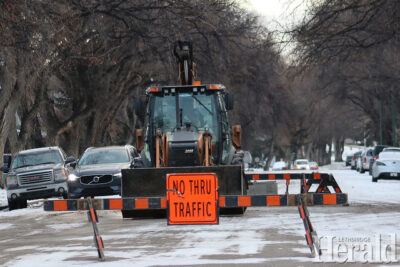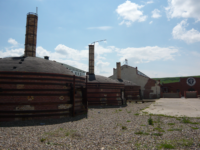Watermain breaks on the downward trend in city
By Al Beeber - Lethbridge Herald on November 30, 2022.
 Herald photo by Al Beeber
Equipment and barricades sit on a southside street Tuesday as City crews prepare to work on a project.
Herald photo by Al Beeber
Equipment and barricades sit on a southside street Tuesday as City crews prepare to work on a project.LETHBRIDGE HERALDabeeber@lethbridgeherald.com
It may be the season for “ho, ho ho” but thanks to the increased potential for watermain breaks in Lethbridge it may also be the season for “oh oh, no.”
For a range of reasons, November through February tend to be months where the city experiences more water service disruptions to residences because of breaks.
The City of Lethbridge water distribution system experiences watermain breaks year-round, caused by a number of factors including aging infrastructure and sudden soil temperature changes, said Water and Wastewater Operations Manager Jeff Koshuta Tuesday.
“Historically, the City finds that a high percentage of these unexpected breaks do occur in November through February” when rapid shifts in temperature tend to change, he said.
Repairs in the winter present additional challenges to crews, particularly with providing temporary water services to residents, Koshuta said.
Repairs in winter also tend to take longer than in summer months.
The City is seeing a declining trend in breaks, he said. In 2022, there have been about 25, down from 35 in 2021 and 39 in 2020, he said.
The ten-year historical average, Koshuta added, is about 48 per year. Going back to 20 years, the average is 57.
One reason breaks are decreasing is because the water utility has a proactive program where it tries to replace about two kilometres of pipe a year, Koshuta said.
Most pipe being replaced is cast-iron pipe in older neighbourhoods – which makes up 90 per cent of the City’s distribution system, or 57 kilometres.
“These breaks are unexpected and it’s very difficult to avoid,” said Koshuta. The City has an idea of the areas in the city that are susceptible to breaks and relies on residents to be the eyes and ears of the community, with expectations that if they see water pooling on the roads or experience a sudden water pressure drop, then they alert the City by calling 311.
Koshuta said the goal is to have breaks repaired in a day but complex ones can take two or three days. He had praise for City crews and the adversity they face working in frigid temperatures.
“The guys do a fantastic job in cold weather.”
Follow @albeebHerald on Twitter
16-15



